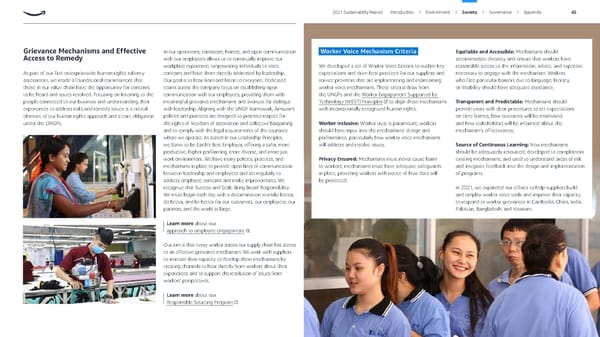Grievance Mechanisms and Effective Access to Remedy As part of our first enterprisewide human rights saliency assessment, we made a foundational commitment that those in our value chain have the opportunity for concerns to be heard and issues resolved. Focusing on listening to the people connected to our business and understanding their experiences to address risks and remedy issues is a critical element of our human rights approach and a core obligation under the UNGPs. In our operations, consistent, honest, and open communication with our employees allows us to continually improve our workplace experience, empowering individuals to voice concerns and have them directly addressed by leadership. Our goal is to hear from and listen to everyone. Dedicated teams across the company focus on establishing open communication with our employees, providing them with meaningful grievance mechanisms and avenues for dialogue with leadership. Aligning with the UNGP framework, Amazon’s policies and practices are designed to promote respect for the rights of freedom of association and collective bargaining and to comply with the legal requirements of the countries where we operate. As stated in our Leadership Principles, we Strive to be Earth’s Best Employer, offering a safer, more productive, higher performing, more diverse, and more just work environment. We have many policies, practices, and mechanisms in place to provide open lines of communication between leadership and employees and act regularly to address employee concerns and make improvements. We recognize that Success and Scale Bring Broad Responsibility. We must begin each day with a determination to make better, do better, and be better for our customers, our employees, our partners, and the world at large. Worker Voice Mechanism Criteria We developed a set of Worker Voice Criteria to outline key expectations and drive best practices for our suppliers and service providers that are implementing and maintaining worker voice mechanisms. These criteria draw from the UNGPs and the Worker Engagement Supported by Technology (WEST) Principles to align these mechanisms with internationally recognized human rights. Worker Inclusive: Worker trust is paramount; workers should have input into the mechanisms’ design and performance, particularly how worker voice mechanisms will address and resolve issues. Privacy Ensured: Mechanisms must never cause harm to workers; mechanisms must have adequate safeguards in place, providing workers with notice of how data will be protected. Equitable and Accessible: Mechanisms should accommodate diversity and ensure that workers have reasonable access to the information, advice, and expertise necessary to engage with the mechanism. Workers who face particular barriers due to language, literacy, or disability should have adequate assistance. Transparent and Predictable: Mechanisms should provide users with clear procedures to set expectations on time frames, how outcomes will be monitored, and how stakeholders will be informed about the mechanism’s effectiveness. Source of Continuous Learning: New mechanisms should be adequately resourced, developed to complement existing mechanisms, and used to understand areas of risk and integrate feedback into the design and implementation of programs. In 2021, we expanded our efforts to help suppliers build and employ worker voice tools and improve their capacity to respond to worker grievances in Cambodia, China, India, Pakistan, Bangladesh, and Vietnam. Our aim is that every worker across our supply chain has access to an effective grievance mechanism. We work with suppliers to increase their capacity to develop these mechanisms by creating channels to hear directly from workers about their experiences and to support the resolution of issues from workers’ perspectives. Learn more about our approach to employee engagement . Learn more about our Responsible Sourcing Program . 2021 Sustainability Report Introduction I Environment I Society I Governance I Appendix 45
 ESG Report | Amazon Page 44 Page 46
ESG Report | Amazon Page 44 Page 46